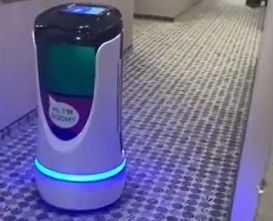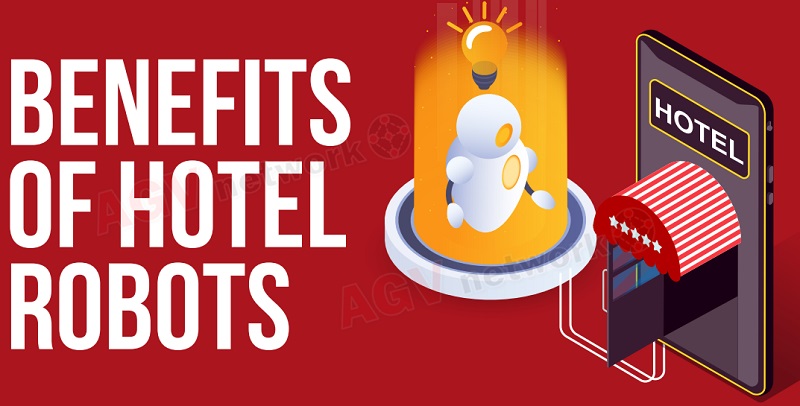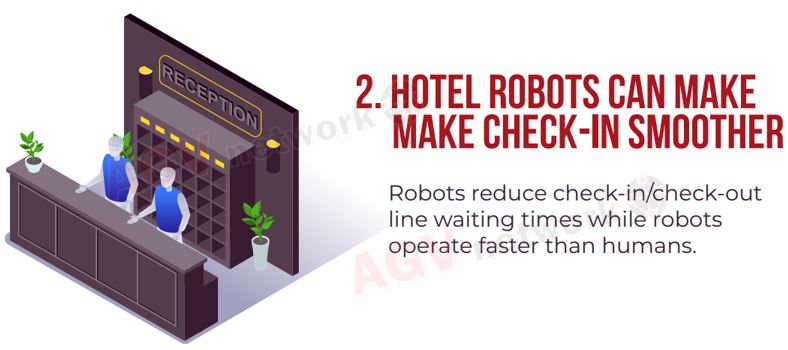Main Advantages and Disadvantages of Hotel Robots
 Today we are living in a world where things like the Internet and Artificial Intelligence has brought multiple changes both good and bad into all areas of our lives, to include hotels. In this article I will discuss the pros and cons of installing robots into hotels.
Today we are living in a world where things like the Internet and Artificial Intelligence has brought multiple changes both good and bad into all areas of our lives, to include hotels. In this article I will discuss the pros and cons of installing robots into hotels.
I've been hosted in the BW Hotel in Bulgaria where I have met “Roomy” , a room service autonomous mobile robot that delivers food, beverages, and other stuff right to rooms.

This is Roomy
It has been wonderful, I'm a robotics nerd... however I have also noticed its coldness.
You know, sometimes, when you're on a long trip, you want (or need) the "human" touch, and you appreciate knowing that someone is taking care of your requirements as a traveler who is far from home.
Obviously, being a robotics enthusiast, I have been intrigued by the subject and have researched the various benefits and drawbacks that robotics may provide the hospitality industry.
🙋🏼♂️ My opinion? Even though I can see the potential of hotel robots, I'm not sure they're a wise choice.

What are the main Advantages of Hotel Robots?
Here is a list of some of the benefits of robots in hotels:
Hotel Robots can make make check-in smoother
Many places such as hotels and cruise lines are now using robots to check in guests. Robots reduce check-in/check-out line waiting times while robots operate faster than humans

You merely go to the check-in area, and a friendly robot greets you and helps you get settled.
It happens the same with the plain check-in counters. If fact, they are fast and they work, but it is always necessary a person to help in case of issues... (I do not remember my reservation code, the boarding card is not printed properly, how do I add some luggage to the reservation....).
On the other hand, as explained below in the cons section, probably a humaniod robot with limited programming features could not be the first thing you wish to find when you arrive to a hotel.

Hotel Robots are not contagious
Unluckily, every time I shake a hand or speak close someone I wonder if I’ve been exposed to covid or some other virus.

Even worse, imagine the cleaning room staff coughing while making your bed.
The last two years have raised the contagion topic and we all now know that humans are an excellent diffusion mean for illnesses, specially in public places like hotels where there’s continuous comings and goings.
Robots does not transmit virus and can be frequently disinfected so the more robots you have the less probability to get acquired infections.
In fact, this topic is very sensitive in the healthcare business where more and more hospital robots are being used for low value tasks like delivering clean linen or medicine to rooms.
Robots don’t get tired
A robot can work 24 hours a day with no need for rest, food, water, etc. If they do not break down, they are always there to make their job. They just go about their jobs and never complain.
Robots free up staff members to perform other guest-related tasks
With robots, hotels reduce their dependency on staff members doing "low value" tasks like bringing room service trays to doors, carrying luggage, answering simple request like asking for more towels, etc.
With robots handling this kind of tasks, the staff can concentrate on other things like providing personalized high value services (welcome customers, respond to complaints, and take care of other critical customer service requirements), or things in the background like doing all the paperwork that goes along with running a hotel, etc.
Robots bring variable costs down

Since they don’t have to pay salaries, healthcare, etc., robots make variable costs much cheaper for hotels.
If, for example, you invest in a robot for carrying luggages, this single robot could substitute the three people needed to cover 24H welcome service.
Human employee replacement by robots can reduce expenditures by 75% while increasing cost effectiveness.
Robots aid in delivering dependable, consistent services

Robots don’t have mood variations or a bad day. Robots do not get offended, and they always will do the same thing exactly how it is programmed.
Tech savvy guests love the experience 
Many people love today’s digital world and enjoy things like robots. They love just asking a robot to do something and getting it done with no problems.
Robots make less mistakes
Hotel Robots do not make mistakes. They are programmed to do the same task exactly the same way over and over again as needed.
What are the Disadvantages of Hotel Robots?
There are likewise several drawbacks to putting robots in hotels. Some even believe they kill the whole meaning of the word “hospitality” since they are not real, warm-blooded and caring human staff.
These disadvantages include:
Hotel Robots are not suitable for the "Hospitality" concept
Let's be clear: Some people don’t like being served by machines and would not come to that hotel, as they want personal services provided by real humans.
People don’t like the robots not calling them by name and interacting with them socially like people do.
Hospitality involves taking care and making an attempt to understand others. Hospitality is the capacity to make others feel at warm at home, and you know, robots are not warm at all.
They are great to do "services" but do not make you feel welcome.
Without the hospitality component, the hotel experience wouldn't have the emotional connection that people love.
The guest's experience and degree of satisfaction might be improved by a facial expression as simple as a smile.... even if... it's true that you can alway program a fake smile on a LCD...
Some customers get upset with the monotony robots bring in some cases.
You can’t expect to get any spontaneous interactions with a robot.
For instance, if they are bringing you a towel, they do it the same way every single time and wouldn’t understand if you ordered it differently. As you can see, I'm again highlighting the lack of "human touch".
Robots are not able to offer any personalized services.
They do the same thing with each and every guest no matter who they are.
Robots are not able to handle special orders made by customers just becasue they would not understand them if the robot has not been previously programmed for that specific order.
No matter how sophisticated a robot is, its intelligence is limited by its programming. On the other hand, people are capable of understanding different wishes and respond appropriately.
Robots' inefficiency in providing services might be attributed to programming limitations, which refer to the fact that they only do what is programmed into them.
Robots initial investment is high
Robots are expensive to set up and initially buy for a hotel if it is small and does not belong to a big chain.
Technology dependency
As any other electronic devices or machines, hotels robots could break down or present some malfunction.
Any robot defect will would bother guests, which will ultimately degrade their "experience." Robots not working properly could hurt a hotel’s reputation.
Robots are not able to handle emergency situations
To stop acts of violence, criminal activity, and terrorist assaults, hotel staff members report any suspicious behavior and actions.
Moreover, the hotel staff is the first contact point for guests in emergency situations.
Additionally, because hotel staff members are trained, they will guide customers to safety during situations and, if necessary, seek medical attention.
Robots are unable to understand suspicious activity and cannot be relied upon to give instructions in times of need.
In a fully robotic hotel, there is no personnel to report emergencies, leaving customers responsible for their own safety.
For instance, when an emergency arises, hotel staff phones 911 to report it and helps to calm the guests down in the meantime.
Robots need skilled staff
It takes lots of training of hotel personnel to learn how to program and otherwise handle the robots. This takes time and money some hotels don’t have. Plus they need to hire people who can fix the robots when they break.
Conclusion
All in all, robots are showing up more and more in the hospitality industry and are expected to grow even more in the future. Especially with recent events like Covid pandemic, you can expect to see them in more and more places.
Robots can efficiently handle the customer service aspect by checking guests in and out, responding to inquiries, and delivering room service, but due to their lack of emotion, they are unable to interact with the guests in a friendly manner.
In my opinion (you can of course disagree), robots are less suitable for social environments; a bot is most helpful when you need specific information quickly or to avoid waiting for something.
Hotel Robots perform great is specific applications like serving a meal but they are not able to understand how do the guest feel about its meal. On the other hand, hotel staff "should" shows concern for the guests' satisfaction and overall experience.
The guest's experience is influenced by both hospitality and service, yet excellent service is never enough.
Summing up: Humans and Robots Are Better Together for Hotel Guest Experience
|
Related articles Where are Autonomous Mobile Robots used? |
 Written by Alfredo Pastor Tella (agvnetwork editor).
Written by Alfredo Pastor Tella (agvnetwork editor).
Follow me on LinkedIn... let's create a mobile robot community to discuss and learn about these outstanding systems.




